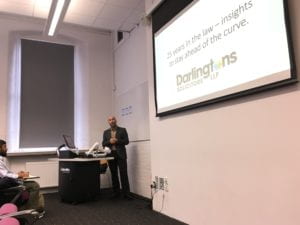
Lawyers in negotiations mode (Photo by Tim Gouw)
Craig Sharpe, Marketing manager at Darlingtons Solicitors LLP, spoke to our LLB Law Year 1 students (14 October 2019) reflecting on his many years of experience in legal practice, focusing on what has changed in legal practice in the last 20 years and how students should prepare if they want to go into practicing as a solicitor, including advice on applications to law firms.
The seminar was integrated in the LLB Law Year 1 module ’21st Century Legal Skills’.
Craig emphasised that proactivity is now a key legal skill required by law firms when recruiting trainees.

Craig Sharpe, Marketing manager, Darlingtons solicitors
He explained that ‘in a world where brands and branding gain ever more importance and where powerful brands are entering into the legal marketplace, smaller law firms should be prepared to compete and respond’.
‘Lawyers are trained to be cautious and risk averse’, Craig noted. ‘This creates a dilemma and an irony in competing in today’s market. Law firms that don’t take some strategic risks and that don’t have a clear idea of who they are and what makes them attractive may pay a heavy price. Being “vanilla” is a risky strategy in itself’.
Craig invited the students to think of a firm’s website as a key marketing tool, taking examples from a small selection of websites and highlighting the following features of their marketing approach:
‘The best example of market position and a modern approach is perhaps Mishcon de Reya, explained Craig: ‘The firm embraces video which is a key asset still not utilised widely in the market. Above all, the website shows the firm has a very clear identity and is looking to attract clients looking for very dynamic lawyers who embrace change’.
He pointed to Pinsent Masons’ website for high quality, in-depth content, which is attracting potential clients looking for very specific expertise, especially in IP, technology law and associated areas.
An interesting example of a firm with clear and bold vision is central London based firm Gannons, Craig told the students; the firm’s website describes very clearly the areas of practice it covers and types of clients it would appeal to, relying on useful insights and case studies.
He then took Streathers Solicitors as an example of a firm that connects very well with people.
Finally, Craig referred to Darlingtons Solicitors as a firm that is highly visible online, with visibility equating to recognition and trusting the firm’s brand.
Following the lecture, our LLB students were invited to take part in a 500 word writing competition – on how solicitors in small and medium firms need to adapt to modern legal practice – leading to the offer of two one-week placements with Darlingtons.
Here are some excerpts from their contributions:
Larah Otoo wrote:
“Adapting to a modern legal practice is comparable to the scientific concept of natural selection from the Darwinian evolutionary theory, more commonly known as ‘survival of the fittest’. Those that are able to adapt, thrive and continue to be successful; those that are unable to, will struggle to keep up and be omitted.”
Henry Norman observed that:
‘The internet has completely and ultimately transformed the way we look for and identify the services we need. With online services being provided after a few keystrokes, it is difficult to understand why sixty percent of SME law firms are not capitalising on this, with nearly three-thousand firms not having any online presence at all (Global Banking and Financial Review, 2018)’.
Alex Choi commented that:
‘Contrary to public perception, the SRA reports that over 90% of legal practitioners belong to small and medium firms. With almost 200,000 solicitors on the Roll in 2019, the legal market is more competitive and saturated than ever before. Against this background, solicitors from small and medium firms must develop a competitive edge through developing the firm’s strengths both externally and internally.’
Finally, Cléo Gasquet noted :
‘Smaller and independent law firms need to adopt less complacent attitudes and a more growth-mindset in order to adapt to modern legal practices. The Bellweather Report 2018: The Culture Clash – solicitor confidence vs client confidence, by Lexis Nexis UK, raises concerns over the complacency of smaller and more independent law firms. Research also shows that three-quarters (75%) of professionals from across the independent legal market believe that the legal landscape is changing at a faster pace than ever, yet only one-in-five acknowledge that significant change is needed within their own firm, in order to keep pace with industry’.
The LLB Law programme at Goldsmiths places significant emphasis on exposing students to the different career paths available to them when they study Law here, and connecting them with potential employers from the moment they become our students.
Read here in more detail how Goldsmiths Law prepares its students for the future.